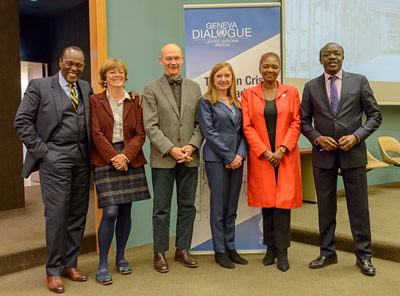Challenges to the multilateral trading system can be met by collective institutions like UNCTAD defending trade's power to pull more people out of poverty.
The time has come to defend the rules-based multilateral trading system as a force for creating inclusive prosperity, UNCTAD Secretary-General Mukhisa Kituyi said at a United Nations meeting of leading international figures in Geneva on Monday.
In a call for “realpolitik”, speakers including Valerie Amos, Director of SOAS, University of London, said that the UN must remain a place where the international community pursues the 2030 Agenda for Sustainable Development.
The event was held against the background of anxiety that the United States is taking steps to undermine the World Trade Organization (WTO), pursue protectionism and spark a trade war with China and others.
If the multilateral trading system stalls, the fear is, the development aspirations of poorer and smaller countries will be scuppered.

Power vacuum
“This is an issue of courage,” said Ms. Amos, a former UN Under-Secretary-General for Humanitarian Affairs, and a former international development minister of the United Kingdom.
“There is an opportunity for countries to fill the power vacuum left by the United States, but countries must find the courage do it.”
The meeting also addressed the failure to reach a deal at the World Trade Organization’s 11th Ministerial Conference in Buenos Aires, in December, the lack of clarity in the trade settlement between the European Union and the United Kingdom after Brexit and other shadows being cast across the multilateral trading system that risk affecting the development agenda.
Pascal Lamy of the Jacques Delors Institute and a former director general of the WTO said the threat of a “trade offensive” from the United States was more “bark than bite”.
He said that it was is clear that US President Donald Trump viewed trade arrangements as unfair to the United States. As a consequence, he said, its new approach was to quit or change the rules in its favour.
Mr. Lamy saw this as leading to three outcomes: from a weakening of the WTO’s rule-upholding capacity, through “a return to GATT” (the forerunner of the WTO) with “shallow discipline” on trade rules, to a WTO “minus the United States”.
Mr. Lamy said the view of the multilateral trading system as a win-win scenario favoured by the United States in the past had been replaced with the view that it was a zero-sum game. He said that there was a possibility that there was indeed unfairness in the system that needed to be addressed but, in his view, quitting the system rather than reforming it was not the right way forward.
Ms. Amos said: “Countries always play the multilateral trading system for their own ends: the question is the extent to which we allow certain countries to lead us down a cul-de-sac.”
Shock to the system
She said the degree of coherence needed to deliver the Sustainable Development Goals, which are the bedrock of the 2030 Agenda for Sustainable Development, can be met by the multilateral trading system and UN bodies with convening power like UNCTAD.
“The trade policy environment is not conducive to delivering the Sustainable Development Goals,” Anabel Gonzalez, a former trade minister of Costa Rica and senior World Bank official, said. The US “repositioning” on trade, and technological change, were a “shock to the system,” she added.
But, Ms. Gonzalez said, there was also “positive energy” coming from some quarters, such as China’s One Belt One Road Initiative, continued interest in the Trans-Pacific Partnership, and Africa’s Continental Free Trade Area – due to be finalized in March.
“Can we harness this energy in a way that will not fragment the system?” she asked.
The discussion, moderated by Jeff Koinange, Kenyan journalist and talk show host on Citizen TV and a former Africa correspondent for CNN, was held as part of UNCTAD’s Geneva Dialogue series of informal conversations with leaders on important trade and development topics.
On Brexit, speakers agreed that the United Kingdom faces significant challenges.
Daunting tasks
“The 52/48% vote (for Brexit) was not just about trade and that’s important to remember,” Ms. Amos said. “From the perspective of people who voted to leave, there were very good reasons for Brexit. That’s important for politicians to remember.”
Mr. Lamy added: “Brexiters are entitled to believe they can remove an egg from an omelette without pain, but I don’t agree. There will be a lot of pain in the UK-EU political system with about 90% of the egg still to be removed.”
Dr. Kituyi called Brexit a “daunting task” because the UK will have to “retool itself” for a new set of trade relationships.
On China, Mr. Lamy said a “frank conversation” was needed about its relationship with United States.
“The elephant in the room is China,” he said, because the multilateral trading system was designed before its economic rise in the last 20 years.
“Is it a poor country with many rich or a rich country with many poor?” he asked.
Ms. Gonzalez said: “I don’t think they’ll be a full-fledged trade war between the US and China but there is friction in the system.”
Concluding, the panellists said that the trading system was upheld by collective decision-making and its ability to bring prosperity to developing countries would ensure its preeminent role in development.
“Multilateralism is morphing from a Westphalian system to something I call ‘poly-governance’ built from coalitions with shared goals,” Mr. Lamy said.
Ms. Amos said that “Collective action is key. There is enormous power when you work together.”
Ending on a hopeful note, Dr. Kituyi said the world was not as bad as seemed.
“We will be able to move past this turbulence and to a world driven by inclusive trade.”



